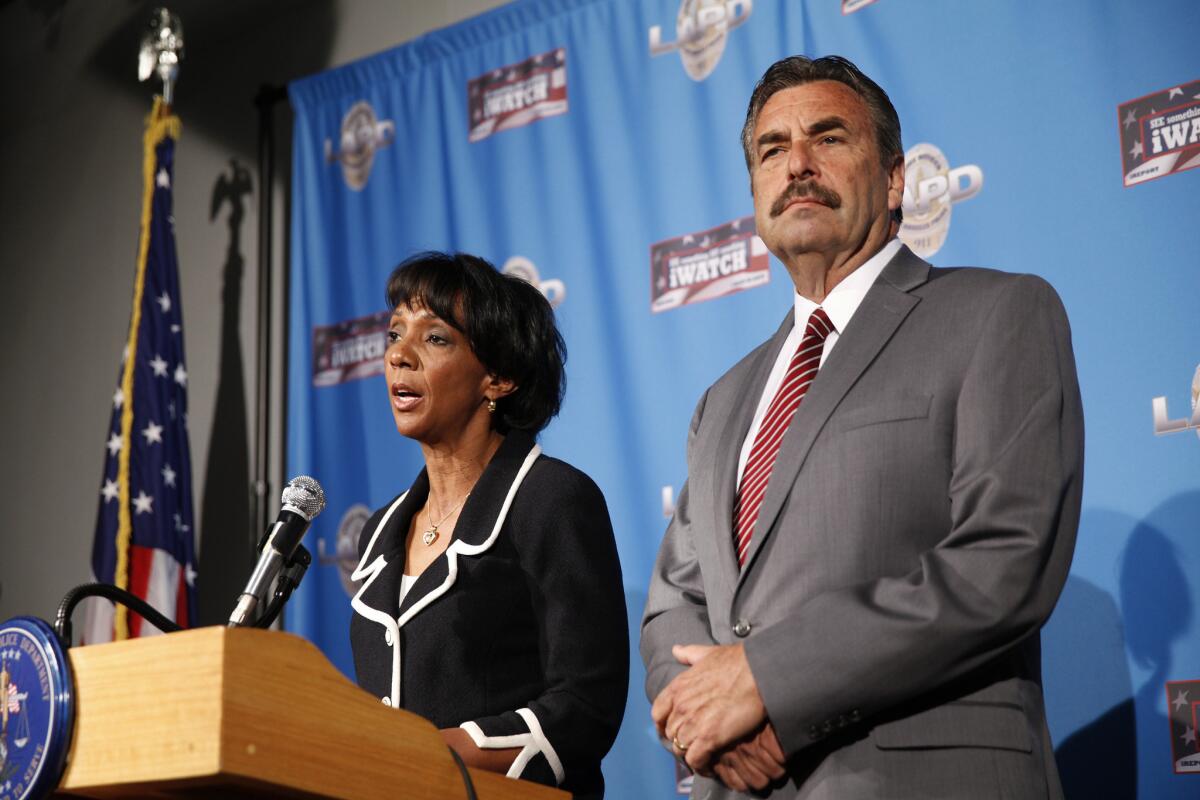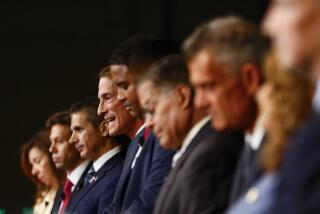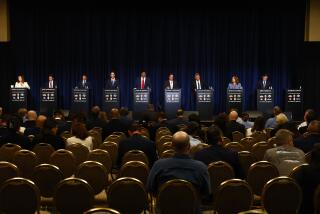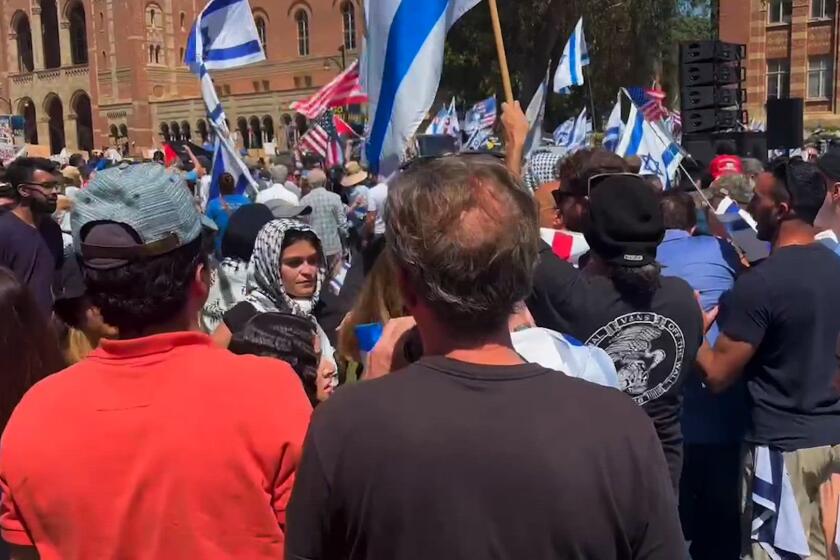D.A. Lacey under pressure after Beck recommends criminal charges against officer in fatal shooting

L.A. police Chief Charlie Beck at a 2014 news conference with Los Angeles County Dist. Atty. Jackie Lacey. Beck has asked Lacey to file charges against an LAPD officer who killed an unarmed man in Venice last year.
In the months leading up to her bid for reelection, Los Angeles County Dist. Atty. Jackie Lacey has found herself under increasing political pressure to take a tougher stance in prosecuting police shootings and use-of-force cases.
This week, an unlikely and influential figure joined the push: Los Angeles Police Chief Charlie Beck.
Beck’s public call for criminal charges against a police officer who fatally shot an unarmed homeless man in Venice immediately spurred others to demand that Lacey file what would be her agency’s first prosecution of an officer in an on-duty shooting in more than 15 years.
An attorney for the homeless man’s family said it would now be “political suicide” for Lacey not to file charges. Mayor Eric Garcetti released a statement asking her to consider Beck’s recommendation “with the utmost gravity,” and a group of activists gathered in Jefferson Park to urge her to move quickly. One called on Lacey to show “the same type of courage that Chief Beck demonstrated.”
Join the conversation on Facebook >>
Any decision Lacey makes in the Venice shooting runs the risk of upsetting either law enforcement groups or community activists, said Raphael Sonenshein, executive director of the Pat Brown Institute for Public Affairs at Cal State L.A. The district attorney’s most prudent act, he said, would be to make a decision based on what she can best justify after considering the evidence.
“Whatever she decides,” Sonenshein said, “there’s going to be very unhappy people.”
Lacey, the county’s first African American district attorney, faces the challenge as the Black Lives Matter movement has rekindled a national debate over race and policing. The veteran prosecutor, who generally shuns the limelight, has met privately with members of the movement but in public has remained largely silent, infuriating some.
Meanwhile, her decision not to file charges in some recent high-profile police use-of-force cases has generated criticism. Last month, some local activists called on her to step down when she declined to prosecute a white California Highway Patrol officer seen on video repeatedly punching a mentally ill black woman by the side of the 10 Freeway. The woman, Marlene Pinnock, won a $1.5-million legal settlement as part of a civil suit, and the officer agreed to resign.
In an interview this week, Lacey defended her decisions, saying she has an obligation to follow the evidence and the law in all cases, including those involving police. She said it would be improper for her to bring charges based on public or media pressure and would also be inappropriate to give special attention to cases involving African Americans.
“The law is supposed to be colorblind,” Lacey said.
Mac Shorty, a member of the Watts Neighborhood Council, criticized Lacey for not prosecuting officers involved in controversial police shootings. Justice “has always been unjust” in South L.A., he said, but when he voted for Lacey in 2012 he thought she would better serve the area. He said he has been disappointed.
“We tend to go after the Police Department because they were the ones that caused the problem, but the problem solver is Jackie Lacey,” Shorty said. “Her failure to prosecute, period, is a disservice to the people of Los Angeles County who elected her.”
Cliff Smith, a member of the South Central Neighborhood Council, questioned why Lacey had yet to make a decision on whether to file charges against two LAPD officers who shot Ezell Ford, a mentally ill black man killed near his South L.A. home in August 2014. The delay, Smith said, stands in contrast to actions by prosecutors in other cities, such as Baltimore, where officers were charged within days of the death of Freddie Gray.
“Her MO has been to try and lay completely in the shadows and hope that everybody forgets about this stuff, but that’s not going to happen,” he said. “This is not going to go away.”
Bernard C. Parks, a former city councilman and LAPD chief, said he thinks Lacey has handled police misconduct allegations appropriately. Winning convictions against officers for on-duty actions, he noted, is difficult. He said Lacey’s job is to file only those cases she believes her office can successfully prosecute.
“The district attorney’s responsibility is not to file cases they don’t believe are winnable,” he said.
Last year, Lacey’s office made headlines when prosecutors won a high-profile assault trial against a veteran LAPD officer captured on a squad car video camera jabbing at the throat and kicking a woman during an arrest in South Los Angeles. The woman, Alesia Thomas, who was black, died soon afterward in police custody. Officer Mary O’Callaghan, who is white, was convicted of assault under color of authority and sentenced to several months in jail.
NEWSLETTER: Get the day’s top headlines from Times Editor Davan Maharaj >>
O’Callaghan’s trial was one of three assault cases brought recently by Lacey against LAPD officers based on video evidence. Officer Jonathan Lai was acquitted last month of charges he used excessive force while detaining a man near Staples Center. The trial of Richard Garcia, charged with assaulting a man who had surrendered to officers in South L.A., is pending.
In the case of Pinnock, the woman punched alongside the freeway, a 42-second video of the encounter sparked national outrage over the CHP officer’s actions.
Lacey, however, cautioned that the video did not capture the moments that led up to the officer striking Pinnock. Interviews with witnesses and other evidence, she said in a statement last month, led her to conclude that CHP Officer Daniel Andrew had to use force to prevent Pinnock from entering the freeway. The district attorney’s statement called the officer’s force “legal and necessary to protect not only his own life but also that of Ms. Pinnock.”
In her interview this week, Lacey said prosecutors still want to examine more evidence in the Ford shooting before deciding whether to charge the officers. Lawyers for Ford’s family in a wrongful-death lawsuit have filed depositions of people who may not have been interviewed by police, she said. Last week, the district attorney’s office asked a federal judge to unseal those records so that prosecutors could review them.
In the Venice shooting, Beck told The Times that LAPD investigators determined that Officer Clifford Proctor opened fire even though Brendon Glenn was unarmed and on his stomach. Proctor, he said, fired twice, striking the 29-year-old in the back.
After reviewing video, witness accounts and other evidence, investigators determined Glenn was not trying to take Proctor’s gun or his partner’s weapon at the time of the shooting, Beck said. Proctor’s partner, the chief added, told investigators he did not know why the officer opened fire.
The May 5 shooting generated fierce criticism of the LAPD and came amid continuing scrutiny of how police officers use force, particularly against African Americans. Glenn was black, as is Proctor.
Asked about why he went public with his recommendation for charges, Beck alluded to the ongoing national debate about policing, calling it a “conversation that has to be had.”
Lacey said that the case is still under review and that her office will make a decision based on a thorough and independent investigation into Glenn’s killing. The D.A.’s legal policy manual, which explains the basic criteria for filing charges, warns prosecutors against basing their decisions on “public or media pressure to charge” as well as “the mere request to charge by a police agency, private citizen or public official.”
“I’m going to do my job to the best of my ability,” Lacey said. “The chief does whatever he does. I don’t feel that should have any impact on how I do my job.”
Twitter: @marisagerber, @katemather
Times staff writer Taylor Goldenstein contributed to this report.
ALSO
Powerball jackpot still rising, reaches $1.5 billion
Two feet of snow expected across northern Sierra Nevada this week
18-year-old woman allegedly stabs boyfriend to death, confesses on Facebook
More to Read
Start your day right
Sign up for Essential California for news, features and recommendations from the L.A. Times and beyond in your inbox six days a week.
You may occasionally receive promotional content from the Los Angeles Times.







